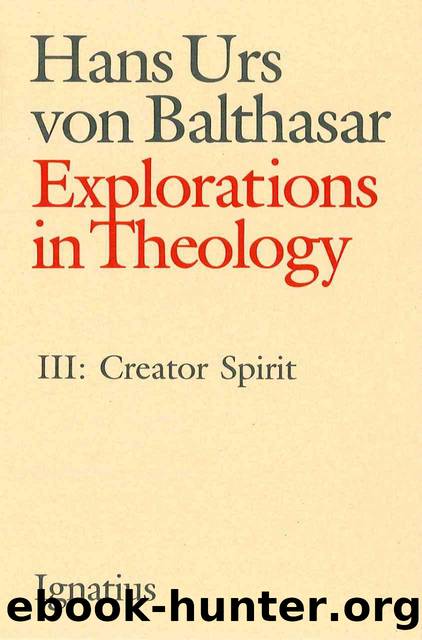Explorations In Theology III: 003 by Hans Urs von Balthasar

Author:Hans Urs von Balthasar [Balthasar, Hans Urs von]
Language: eng
Format: epub
Tags: Spiritual & Religion
ISBN: 9780898704372
Publisher: Ignatius Press
Published: 2012-08-31T04:00:00+00:00
The law of the communication of the spirituality of Jesus
If one returns from the peak of the spiritualities united in Jesus to their multiplicity in the Church and in humanity, there follows automatically from what has just been said the principle that the spirituality of the gospel does not enter a âsynthesisâ with anything else, as if it were only the partial aspect of an all-embracing whole. It cannot therefore be a question of needing to bring the spirituality of the gospel into a synthesis with, for example, the spirituality of âcultural progressâ or of the âage of technologyâ, a synthesis that would have to be discovered by myself, this âman of the twentieth centuryâ, and whose point of unity I would have to be. In a Christian perspective, the synthetic point between God and the world, and the concrete integration of the world in the direction of God, always lies with Christ.
This, like every saying of the gospel, is a âhard sayingâ; in order to make it comprehensible, it must be transposed back into the existential context of the gospel. Were the gospel a philosophy of religion for Everyman, or an abstract ethics for Everyman, then this hardness would be inappropriate. But the inherent form of the gospel requires that man follow Jesus by staking everything, with ultimate decisiveness, on the one card and abandoning the rest of the card game: âleaving everythingâ without looking back, without laying down as a precondition a âsynthesisâ between Jesus and saying farewell to those in oneâs home, between Jesus and burying oneâs own father, or between Jesus and anything else at all. âTo take oneâs cross upon oneâ means the same absolute preference of the holy will of God to all oneâs own plans and preferences and affections: father, mother, wife, child, field, etc. The criterion, the âcanonâ, is that one does not make a synthesis. Where someone understands this and does it, where one is not only âcalledâ but also âchosenâ through the Yes he utters, his life becomes âcanonicalâ in the Christian sense. He is this, thanks to the indivisibility of his Yes (or of his existential faith) and of his existence, and (whether canonized by the Church or not) he is a canonical Christian, a âsaintâ. The saints, however, are the criterion for all the others: even now, they are the judges of the world, and a fortiori in the last judgment (1 Cor 6:1f.), They are the Analogatum princeps (since they bear in themselves the âform of Christâ) in terms of which, as the perfecta ratio,1 the statement about the other anahgata is made. The existence of the saints âexcusesâ the existence of the others who make compromises; this is the only possible way for an (analogous) universal concept of Christian existence to come into being. But since the Analogatum princeps becomes the criterion on the basis of the Christian decision (to stake everything on the one card), this criterion cannot lie primarily in the neutrality of the
Download
This site does not store any files on its server. We only index and link to content provided by other sites. Please contact the content providers to delete copyright contents if any and email us, we'll remove relevant links or contents immediately.
Christian Ethics by Wilkens Steve;(854)
Christian Ethics for a Digital Society by Kate Ott(778)
Fearfully and Wonderfully Made by Philip Yancey & Paul Brand(769)
God and the Multiverse by Victor J. Stenger(672)
Numbers by Ronald B. Allen(632)
How to Read Slowly by James W. Sire(613)
Christian Ethics: An Introduction to Biblical Moral Reasoning by Wayne Grudem(597)
The City of God by Saint Augustine & Marcus Dods(577)
Monastic Archaeology by Unknown(564)
Morality by Jonathan Sacks(564)
The Technological System by Jacques Ellul(543)
Amish Grace by Donald B. Kraybill & Nolt Steven M. & Weaver-Zercher David L(531)
Death of the Doctor by Unknown(525)
The Disabled Church by Rebecca F. Spurrier;(521)
Jesus: A New Vision by Whitley Strieber(518)
Children of Lucifer; The Origins of Modern Religious Satanism by Ruben van Luijk(505)
Critical Writings by Joyce James;(499)
Redeeming Sociology by Vern S. Poythress(485)
The Church in the Early Middle Ages by G.R. Evans(474)
